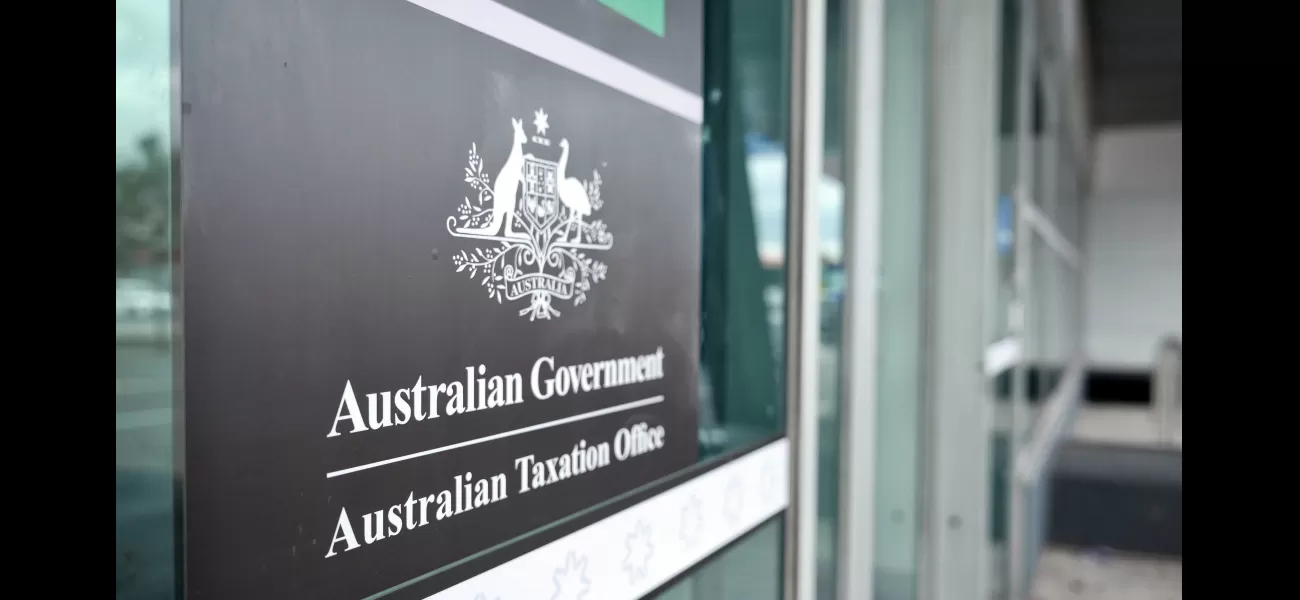Abusers manipulate taxes to burden victims with significant debts.
People want government to make a law to stop "sexually transmitted tax debt."
June 19th 2024.

Perpetrators of domestic violence are using a sneaky tactic to put their victims in financial turmoil, causing them to be burdened with unjust debts that can reach up to tens of thousands of dollars. This has sparked a call for the government to take action and close the loopholes that are allowing this type of abuse to happen. A group of experts from the University of NSW's Sydney Business School and Gendered Violence Research Network have released a set of recommendations to address this issue and prevent the manipulation of the tax system.
According to these researchers, abusers are putting their victim-survivors in a difficult position by putting company debts in their name without their knowledge or consent. This can happen even after the victim has escaped the abusive relationship. Under current Australian tax law, the victim is held responsible for repaying the debt, regardless of whether they were aware of it or not. Shockingly, the average size of these "sexually transmitted tax debts" is a staggering $90,000, which can lead to dangerous cycles of debt, insecure housing, and even bankruptcy.
The Sydney Business School has stated that this is a common occurrence, especially this year as the Australian Taxation Office is catching up on pursuing business debts after pausing during the pandemic. Despite having productive discussions with the ATO, the researchers believe that new laws are necessary to properly address this form of coercive control.
Associate Professor Ann Kayis-Kumar has put forward a recommendation for the government to adopt tax provisions that have been in place in the United States since the 1970s. She believes that if Australia is serious about tackling this issue, urgent action needs to be taken to modernize the tax system and identify and support victim-survivors. In the United States, they have a provision called "innocent spouse relief" that provides specific tax relief for victim-survivors of intimate partner financial abuse, ensuring that the tax office only pursues the person responsible for creating the debt. Australia does not have this provision, but it is crucial that they implement it.
The researchers have included real-life stories of domestic abuse victim-survivors in their paper, such as Carol*, who was coerced into signing paperwork by her ex-partner, making her a company director without her knowledge. After leaving the relationship due to domestic violence, she received a director's penalty notice from the ATO for approximately $175,000. This has put her in a difficult situation, and if she is unable to defend herself, she may have to declare bankruptcy for a debt that she had no knowledge of or responsibility for creating. This is just one example of how the tax system is being weaponized against victim-survivors.
The paper has been presented to the federal assistant minister for the prevention of family violence and social services, Justine Elliot, and the researchers are urging the government to change the law so that debt is always attributed to the person responsible for creating it. This would provide much-needed protection for victim-survivors and prevent them from being held accountable for debts that they did not incur.
It's important to note that support is available for those who have experienced domestic violence. Resources such as the National Sexual Assault, Domestic Family Violence Counselling Service at 1800RESPECT can provide assistance. If you or someone you know is in immediate danger, please call 000 for emergency help. Let's work together to end domestic violence and support those who have been affected by it.
According to these researchers, abusers are putting their victim-survivors in a difficult position by putting company debts in their name without their knowledge or consent. This can happen even after the victim has escaped the abusive relationship. Under current Australian tax law, the victim is held responsible for repaying the debt, regardless of whether they were aware of it or not. Shockingly, the average size of these "sexually transmitted tax debts" is a staggering $90,000, which can lead to dangerous cycles of debt, insecure housing, and even bankruptcy.
The Sydney Business School has stated that this is a common occurrence, especially this year as the Australian Taxation Office is catching up on pursuing business debts after pausing during the pandemic. Despite having productive discussions with the ATO, the researchers believe that new laws are necessary to properly address this form of coercive control.
Associate Professor Ann Kayis-Kumar has put forward a recommendation for the government to adopt tax provisions that have been in place in the United States since the 1970s. She believes that if Australia is serious about tackling this issue, urgent action needs to be taken to modernize the tax system and identify and support victim-survivors. In the United States, they have a provision called "innocent spouse relief" that provides specific tax relief for victim-survivors of intimate partner financial abuse, ensuring that the tax office only pursues the person responsible for creating the debt. Australia does not have this provision, but it is crucial that they implement it.
The researchers have included real-life stories of domestic abuse victim-survivors in their paper, such as Carol*, who was coerced into signing paperwork by her ex-partner, making her a company director without her knowledge. After leaving the relationship due to domestic violence, she received a director's penalty notice from the ATO for approximately $175,000. This has put her in a difficult situation, and if she is unable to defend herself, she may have to declare bankruptcy for a debt that she had no knowledge of or responsibility for creating. This is just one example of how the tax system is being weaponized against victim-survivors.
The paper has been presented to the federal assistant minister for the prevention of family violence and social services, Justine Elliot, and the researchers are urging the government to change the law so that debt is always attributed to the person responsible for creating it. This would provide much-needed protection for victim-survivors and prevent them from being held accountable for debts that they did not incur.
It's important to note that support is available for those who have experienced domestic violence. Resources such as the National Sexual Assault, Domestic Family Violence Counselling Service at 1800RESPECT can provide assistance. If you or someone you know is in immediate danger, please call 000 for emergency help. Let's work together to end domestic violence and support those who have been affected by it.
[This article has been trending online recently and has been generated with AI. Your feed is customized.]
[Generative AI is experimental.]
0
0
Submit Comment





